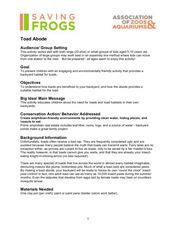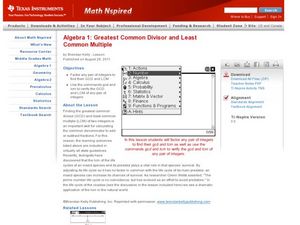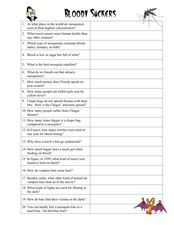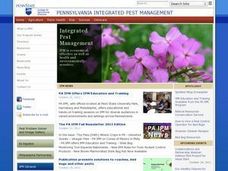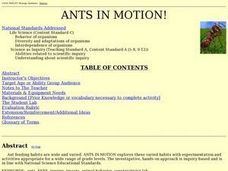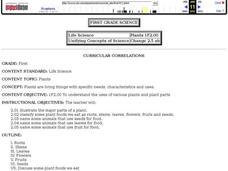Curated OER
Toad Adobe
Students explore the importance of toads and the need for toad habitats in the environment. In this animal habitats instructional activity, students create an adobe habitat for toads by using a clay pot. Students paint their pots and...
Curated OER
Plants 'n' Bugs
Second graders experiment to find if pollinators have color preferences. In this plant and bug instructional activity, 2nd graders gather information about how flowers pollinate. Students participate in a pollination experiment using...
Texas Instruments
Greatest Common Divisor and Least Common Multiple
Students solve problems using the GCD and LCM. In this algebra instructional activity, students factor and simplify equations using the greatest common and least common factors and multiples. They factor integers in pairs.
Curated OER
Environmental Problems and Solutions
In this environmental problems and solutions worksheet, students are given a list of 25 environmental problems. They match them with a given solution and paste the matching pairs to a piece of construction paper.
Curated OER
Bloody Suckers
In this blood sucking animals worksheet, students answer 20 questions about leeches, mosquitoes, Chepo bugs, and bats which all suck blood to transmit diseases or get nutrients.
Curated OER
Mosquitoes
In this mosquitoes information worksheet, students read for comprehension and vocabulary assessment. In this multiple choice worksheet, students answer twelve questions.
Curated OER
Food Poisoning
Identify strategies that prevent food-borne illnesses and contamination. National Standard 14.4.1 Identify food-borne illness Identify types of food-borne illness and their symptoms: botulism, e-coli, hepatitis, salmonella, staphylococci...
Curated OER
Shedding Light on Watersheds
High schoolers discuss what a watershed is, complete online activities showing them how to take care of a watershed, and create a model of a watershed that they experiment with to see what happens when it is disrupted by civilization.
Curated OER
Environmental Health Hazards and Children
Students are introduced to the environmental hazards their community is facing. In groups, they develop a list of the ways humans have changed the Earth and how these changes have lead to environmental hazards. They record their...
Curated OER
Termite Trail Marking Behavior
Learners examine termites and their trail-marking behaviors. They draw lines on paper with various ink pens and experiment to see which types of ink the termites follow--or which inks do and do not elicit trail marking behavior.
Curated OER
Animals, Soil, Trees
Fourth graders describe the various kinds of soils and how plants and animals are affected by them. They describe the baic needs of plants, scoring at least a 3 or 4 on a 4-point rubic. Students are able to predict and/or infer what...
Curated OER
THE PEANUT WIZARD
Students read information about George Washington Carver and outline the information. They are given peanuts in the shell, students examine them and eat them. Students discuss the following questions: Why did George Washington Carver...
Curated OER
EPA Pesticides Reduction
Young scholars examine the effects of pesticides on the environment and bugs. They answer questions as an assessment.
Curated OER
Bats -- Pests or Pals?
Fourth graders examine a bat and determine if it is a pest or pal. They identify three types of bats native to the state of Pennsylvania. They also identify the parts of a bat and write a report on the bat of their choice.
Curated OER
Ants In Motion
Students brainstorm ants and their characteristics in a class discussion. They observe the ants and answer question pertaining to their behavior; then they apply the scientific method in creating and investigating a problem.
Curated OER
Life Science Review for Grade 4
For this life science review for grade 4 worksheet, 4th graders answer 25 multiple choice questions in standardized test format about life science.
Curated OER
Termitology
Students engage in an inquiry-based study of the ecology of termites. Through hands-on investigations, they explore the life cycle of termites, the termite's role in the food web, and the unique social structure of termite colonies.
Curated OER
Mosquitoes
In these reading comprehension worksheets, learners read the informational passage about mosquitoes. Students then answer 5 reading comprehension questions and 7 vocabulary questions about the text.
Curated OER
Frederica: An 18th-Century Planned Community
Learners explore life as early settlers in Frederica by pretending to be crafts/tradesmen there and writing letters describing the fort/town to a friend or family member still in Great Britain, debating reconstruction vs. preservation,...
Curated OER
Flour Beetles
Students observe life stages in flour beetles and graph the results. They write a summary report.
Curated OER
Food Poisoning
Students study the prevention of the four major types of food poisoning. They write a letter of advice to an imaginary friend who has had food poisoning seven times within the last year.
Curated OER
Protecting Against the West Nile Virus
Students anaylyze how the west nile virus is passed from mosquitoes to humans. They answer questions based on an article from the CDC. They finally examine their state map and track where cases have been reported.
Curated OER
Particulate Observation Lab
Students collect samples of common dust from their homes and school for examination under a microscope. They identify the components of their samples using the provided "Atlas of Indoor Dust Particles." Pupils take samples form a variety...
Curated OER
Plants
Students illustrate the major parts of a plant, classify some plant foods we eat as roots, stems, leaves, flowers, fruits and seeds. They also name some animals that use seeds, leaves, and fruit for food.


